To mark Black History Month, YSJ geography student Francisca Rockey interviewed Olalekan Adekola, lecturer in Geography and member of the Institute for Social Justice steering group.
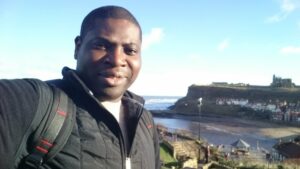
So, Olalekan tell me a bit about your academic background and career?
I am a lecturer in Geography. I hold a Bachelor’s degree in Geography from Federal University of Technology, Yola, Nigeria, a Master’s degree in Environmental Sciences from Wageningen University, The Netherlands, and a PhD in Geography from the University of Leeds, United Kingdom. In the UK, I have worked as a Research Assistant at the University of Glasgow, and as a Research Fellow at the University of the West of England, Bristol before I joined York St John University in January 2018.
Before studying geography, where did your interests in the environment, earth features etc come from? In short, how did you discover you had a love for Geography?
I have always been fascinated by differences in places. I remember as a child traveling with my family at Christmas, driving through major cities in south west of Nigeria and observing differences in buildings, vegetations, cultures, etc among a supposedly homogeneous people. This made me ask a lot of questions that triggered my interests and led me to read more books about other places and cultures. Looking back, I can say my love for geography started quite early on in life. However, I did not set out to study Geography in the university at the undergraduate level. Because I studied core Sciences in secondary school, I was doing subjects like Physics, Chemistry, Technical Drawing, Further Mathematics, etc. With these subjects, it was almost expected that I will go on to study an Engineering course. As fate would have it, I was offered the opportunity to study Geography. Initially, I did not like it, but soon realised that the skills and knowledge gained from my science subjects were very relevant to the modules I am taking. I saw how my knowledge of Physics and Chemistry were useful in Climatology and Geomorphology classes, Biology in Vegetation Studies and Biogeography classes and so on. I sort of appreciated the idea that things that I have studied, and knowledge gained in secondary school are still very relevant during my undergraduate degree and can all be brought together under this one discipline. There was also the realisation of the societal relevance of Geography and I could see the practical applications of the things I was learning in class in everyday life. These realisations strengthened and solidified my love for Geography throughout my undergraduate degree. Since then I have not ‘left’ Geography and I am a proud Geographer because Geography has made me and taken me to where I am today, so I am proud of Geography.
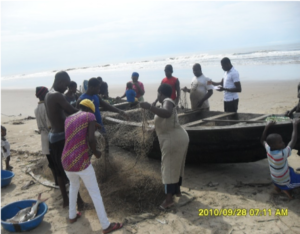
Interviewing fishermen
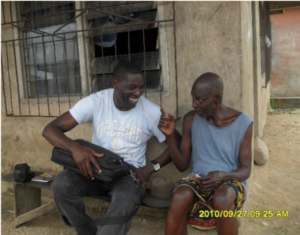
Interviewing a community leader
Geography is a very broad subject; do you have a favourite area?
Yes, Geography is broad, but it is a holistic discipline that helps us combine natural and social science as a means to explain and solve, real-world problems. My approach has been to always look at things from this holistic perspective because in trying to approach inquiries in Geography, we ask the how, what, where, why questions. To answer these questions satisfactorily, one will discover that you tend to touch on different aspects or the different areas of geography. For example, if you are exploring a topic such as climate change as a Geographer, you will soon discover that you will be drawn into both physical and human phenomena and its spatial patterns. So, rather than having one favourite area, I will say I like the interdisciplinary area (interdisciplinarity) of Geography. That ability to examine an issue from a broad-ranging perspective, considering a complex mix of phenomena and processes (physical and human). This allows me to touch on the different areas of Geography.
That said, I will say I am highly interested in Environmental Geography. This is an area of Geography that focuses on interactions between humans and nature and how we affect the environment and our planet. I am passionate about the conservation of biodiversity. However, my lived experiences and interactions with local communities through my research have taught me that we cannot achieve much without understanding, involving, and listening to local voices. This aspect of Geography gives me that chance to explore a societal challenge using a systematic approach drawing on physical and human areas of Geography.
Have you faced any barriers in your career?
One of the recent happenings such as Covid-19, the murder of George Floyd, and Cooper-gate (in New York) have helped shine a light on the systemic inequalities that members of the BAME (black, Asian and minority ethnic – nearly anyone non-white) community face in their everyday lives. It is often challenging because some of the underlying issues are institutional and inferred into policies and practices. It often means that you could face some form of barriers as a BAME employee irrespective of where you work. This could explain why most BAME academics often feel undervalued and disappointed when their career progressions fail to meet the expectations, they have charted out for themselves. On a personal note, I have faced challenges; however, most of these could result from the trajectory my career has taken. I must say York St John is taking some positive steps and is trying to ensure that these barriers are reduced. For instance, YSJ is now a member of the Race Equality Charter. This will help the University develop policies and initiatives that will ensure that BAME staff have positive experiences at the University. Also, a lot of work is going into diversifying the student’s population, which will ensure that BAME students don’t feel unwelcome. For me, as a BAME staff, having more will help, but also will benefit the system.
What literature would you recommend for beginners to Geography?
As an undergraduate student, I found value in following the news: listening to radio and reading newspapers. In those days, we get access to daily news from radio stations than television, and there were no social media. So, I was used to listening to news from within my society (Radio Nigeria), but also the USA (Voice of America); United Kingdom (BBC Hausa service) and Germany (Deutsche Welle radio). There were a lot of discussion programmes that I found relevant issues to my study and the diversity of topics is vast, and they usually focus on topics in the news providing insights into geographical issues that are happening in the world. I found out that I can relate, things that have been taught in the class to things that are contemporary and happening in the news. I was able to bring these knowledges in when I write my essays. I believe that ability to draw on examples from diverse contexts sort of impressed some of my lecturers. I still spend about an hour a day to scan through the news and know what is going on around the world in different aspects, it helps boost my knowledge. I should warn that one should be critical when listening to these news sources and not take what is said at face value, because the media is now filled with sensationalism and are always in the danger of telling a single story, especially when it comes to reports from developing countries. Students need to draw on academic literature to ensure that their discussions are of critical academic standards worthy of the best grades in assignments. One of the most fascinating literature I have read is the book by Piers Blaikie, ‘The Political Economy of Soil Erosion in Developing Countries’. Before reading this book, I have viewed environmental degradation as a wholly natural process, this book opened my eyes to the political-economic dimensions of environmental change. Another book that will be of interest to beginners to Geography and perhaps discusses broader concepts is ‘Understanding World Regional Geography’ by Erin Fouberg and William Moseley. This book can help beginners enhance their knowledge of world Geography through getting them to think and challenge their existing perception of different regions.
What’s your area of research and what upcoming research are you doing?
Sometimes I ask myself the same question. I guess I am interested in any research that has practical usability, is of value to society and impacts people’s wellbeing. As such, my research interests are influenced by the ability to contribute to reducing the impact of differential access to resources on livelihoods and the environment. The goal of my research has been to use interdisciplinary principles and methods in order to understand and construct reliable scientific knowledge of local and global environmental change and its impact on livelihoods, and to apply this knowledge in the quest for effective solutions. I have worked on projects on poverty analysis, valuation of ecosystem services, sustainable flood management etc. A common theme that ties my recent research projects together is the need to engage diverse stakeholders, especially local communities in designing sustainable solutions. I have recently completed a project on co-designing climate-resilient measures with aquaculture stakeholders in Kenya and another completed project based on case study Bangladesh and Nigeria designed a framework for a sustainable ship breaking process for cleaner environment and better wellbeing. Together with colleagues in School of Humanities, we received funding from the Institute for Social Justice to explore a collaborative approach that ensures everyone have a voice in flood management in York. I am currently working on a project looking at the management of cultural ecosystem services in the coastal areas of Mozambique. There are a few proposals I am working on and hope that we can secure funds to do the research. One is exploring the concept of ‘food sovereignty’. I also have an interest and continue to research and publish on aspects that explore the internationalisation of Higher Education.
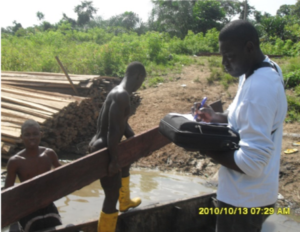
Interviewing loggers
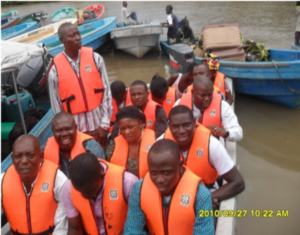
Trip to Niger Delta
What advice would you give to aspiring Black geographers?
First is to encourage them to see the value of Geography in the current dispensation of things and know that they are or will be studying a course that could put them in a position where they will be shaping society and people’s lives. Geographers have become influential in framing and shaping public discourse which can influence decision making. It is increasingly clear that knowledge of Geography is highly relevant to many of the challenges facing society and the environment today. They are uniquely placed to be part of the solution hence take it seriously.
Tell your story not someone else’s! Second is for aspiring black Geographers to understand that they have a story, which from my experience is often different from experiences of people from other background. Remember: Tell your story, No one can tell your story, so tell it yourself. No one can write your story, so write it yourself.
You should start early networking with academics, leaders, and peers in the field. This can be a very helpful means for you to gain useful advice from others who are successful. You can even learn information and upcoming changes that may be happening within your field.
This interview is one of a series being conducted over the course of Black History Month with Black academics, professionals, sports and tv personalities to amplify their voices to students at YSJU. Other interviews are being conducted by the SU and will be published on the Student Union website by Kalen Reid, our BAME officer.


